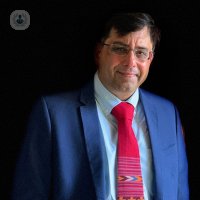What does it mean if I have a painful breast lump?
Written by:Finding a breast lump is not only a trigger for consulting a doctor but also a period of time when the patient experiences considerable anxiety. They are understandably worried about the possibilities what this the true nature of it is. Top consultant breast oncologist Mr Sumohan Chatterjee, speaks to Top Doctors about this sensitive situation and what medical support is available for women who have found a breast lump.
Successful campaigns in the last couple of decades has made women more breast aware, leading to more hospital visits and leads to early diagnosis of breast cancer and better outcome. However, it is important to note most lumps are not cancer and only one per cent of cancer patients present with pain.

What is a breast lump and what causes them? Why do some breast lumps hurt?
Most breast lumps (including cancerous ones) are painless. Pain in breast lumps usually means local pressure (rapidly enlarging lump like a cyst), infection (abscess) or change within a lump (fibroadenoma becoming sensitive to the hormone oestrogen).
Are breast lumps often cancerous?
All breast lumps should be assessed in a properly-resourced breast clinic which should include:
- History
- Examination by a surgeon followed by;
- Imaging (Ultrasound scan for all ages and mammogram over patients above the age of 40) under the guidance of a radiologist and a core biopsy (where a sample of tissue from a mass or lump is taken)
This is called triple assessment which also includes discussion in multidisciplinary meeting to check for concordance (consistency). If this mantra is followed, it minimises risk of missed cancer diagnosis.
When will I likely know the results?
Harmless breast lumps feel smooth and mobile whereas cancerous lumps feel hard (like a stone) and have irregular margins. However, there can be an exception to the rules so all lumps need proper assessment. Most patients are given a fair indication of what it is likely to be the case after examination and imaging, but biopsy results are not available on the day and can take three to seven days.
When should I be concerned about a painful breast lump?
Finding a lump in your breast can be frightening - and although breast cancer is the most common cancer found in women, most breast lumps are not cancer, especially in women below the age of 40. In fact, more than 80 per cent of them end up being benign (harmless). In a small percentage of women, a painful breast lump turns out to be cancer.
What will happen when I go to the doctor to get it checked out?
The advice is simple to all women: Please remain vigilant and breast aware if you find any change including a lump. Please seek expert help. Our one-stop breast clinics, run by experts, are ready to assess you either to provide reassurance or in a minority of cases, establish a diagnosis and initiate appropriate management. The mantra is triple assessment which includes history and examination, imaging as appropriate and biopsy when required; a concordant assessment gives the best chance of not missing a cancer.
If you’re concerned about a breast lump or require a consultation related to other breast health issues, book an appointment with Mr Chatterjee. To do so, visit his Top Doctors profile here.


